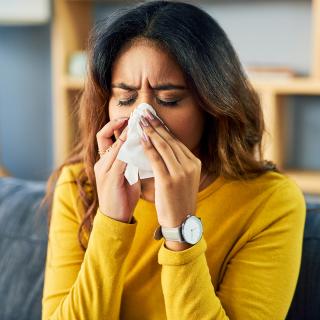Tips for surviving seasonal allergies with asthma

It’s allergy season and that means you or someone you love is likely to experience sneezing, a stuffy or runny nose, and itchy or watery eyes. Seasonal allergic rhinitis, also known as hay fever, is a common condition affecting more than 5 million children and 19 million adults.1 Symptoms are usually the most prevalent in the fall and spring when there is more pollen from trees, grass, and weeds circulating in the air.
For the 25 million Americans who have asthma,2 allergy season can be a particularly difficult time of year. On top of pollen, dry, wet, or windy weather can make asthma worse.
What makes some allergy seasons worse?
How bad the allergy season is depends on a couple of different factors. The first is climate. Milder temperatures and warmer winters cause plants to pollinate earlier. This results in a longer spring allergy season. Once someone who suffers from allergies is exposed to pollen — or other allergy triggers — their immune system is primed to react to the allergen. This means that even if temperatures cool down later, they will still experience allergy symptoms and have to deal with them for longer.
The second factor is rain. Rain can break up clumps of grass and weed pollen into smaller particles that can spread through the air more quickly and increase allergy symptoms. Rain and humidity also spur the growth of grass, weeds, mold, and dust.
How do seasonal allergies affect asthma?
If you have asthma, you may find that your symptoms get worse during allergy season. That’s because your immune system sees allergens, like pollen or dust, as harmful. In response, your body releases a substance called immunoglobulin E (or IgE) to attack it. However, too much IgE can cause swelling in your airways, making it harder for you to breathe and possibly triggering an asthma attack.
What can I do to help with allergies?
While there are certain things you can’t control, like the weather, you don’t have to suffer through allergy season. Here are some quick tips:
- Limit exposure to allergens by keeping windows and doors shut at home.
- Stay inside during midday to afternoon hours, when the pollen count is at its peak.
- Monitor daily pollen counts to avoid certain exposure.
- Wear a mask when doing outdoor chores, such as mowing the lawn, and always shower afterward.
What are my medication options?
If your allergy symptoms are substantial, your doctor may recommend allergy medications. Many antihistamines, nasal corticosteroids, and decongestants are available over the counter or by prescription.
Remember to review the medication label and follow the directions as listed on all allergy medications. These medications can help with symptom relief and can be taken as needed, with input from your doctor or pharmacist.
In addition to pills and nasal sprays, some allergists may recommend immunotherapy through weekly or monthly allergy shots or daily tablets that dissolve under your tongue.
If you have severe enough allergies to require medication, remember that it’s best to begin treatment before tree pollen is in the air and allergy symptoms develop. By starting early, the medication can stop the release of histamines and other chemicals and help lessen your symptoms. It’s also important to take your medication as prescribed, not just when symptoms occur.
Express Scripts® Pharmacy is here for you
If you have questions about seasonal allergies or anything else allergy or asthma related, our specially trained pharmacists are here to help. They have deep knowledge and understanding of your condition and are available 24/7 to help you stay healthy this allergy season and beyond.
1 Asthma and Allergy Foundation of America: Allergy Facts and Figures (accessed March 2022): aafa.org.
2 Centers for Disease Control and Prevention: 2019 National Health Interview Survey (NHIS) Data (accessed March 2022): https://www.cdc.gov/asthma/nhis/2019/table3-1.htm.
Posted date: April 05, 2022


